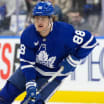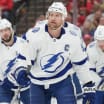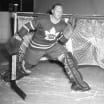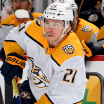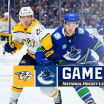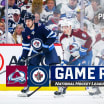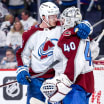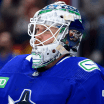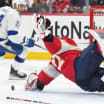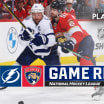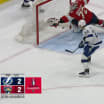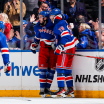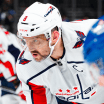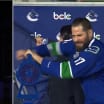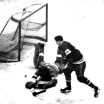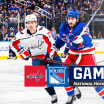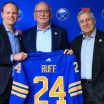Legendary hockey reporter Stan Fischler writes a weekly scrapbook for NHL.com. Fischler, known as "The Hockey Maven," shares his humor and insight with readers each Wednesday.
This week Fischler features his popular "Voices From the Past" with two-time Stanley Cup winner Ed Van Impe, who was the second captain in Philadelphia Flyers history.
A defenseman, Van Impe reached the NHL after surviving a near-fatal auto crash and a long, slow climb through the minor leagues. Fischler interviewed Van Impe in 1971 for "Up From The Minor Leagues Of Hockey," which he co-authored with his wife, Shirley.
Van Impe overcame obstacles before winning Stanley Cup with Flyers
Defenseman recalls car crash, playing six seasons in minors before achieving NHL success
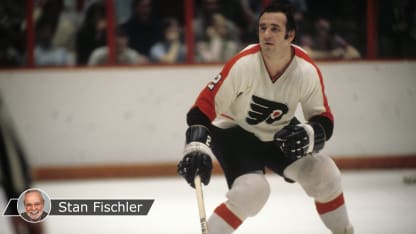
By
Stan Fischler
Special to NHL.com
How did you begin playing hockey?
"I had a cousin, Richard, who lived half a block away from our house in Saskatoon (Saskatchewan), he was three years older and like a big brother to me. When I was six, Richard gave me a pair of his old hockey skates. Although they were too big for me, I put stuffing inside and they were good enough to learn on in the skating rink behind his house. Sometimes the weather was so cold we'd light matches in our boots to warm them up. My father, who was a good senior level player in his day, loved to take me to Saskatoon Arena where the Saskatoon Quakers played Western League games."
Which was your favorite team growing up and who was your idol?
"Because I loved listening to Foster Hewitt do the Maple Leafs games on "Hockey Night in Canada" radio broadcasts, I became a Toronto fan, yet my favorite player was Doug Harvey, the great defenseman with the Montreal Canadiens. His style -- cool in his defensive zone -- impressed me. Doug always seemed to know what to do with the puck when he got it. The guy achieved a maximum of results with a minimum of effort. I liked that and copied him when I got to play Junior hockey for Saskatoon."
What were your biggest challenges as a young hockey player?
"The transportation. We took long trips in the cold Saskatchewan winter confined to a school bus or a car. Either way it was terrible. Driving conditions were treacherous and we'd always wonder whether we'd arrive at our destination in one piece. If we had a breakdown, God knows what would have happened to us. I should know because I nearly didn't come out of that league alive thanks to the driving conditions."
How bad was the accident you were in?
"Five of us were driving in a two-door hardtop when a farmer hit us head on and we all went flying out of the car. I was sitting in the middle of the back seat and the door flew open and I flew out of the door. I did a couple of cartwheels and landed in a ditch. Thinking back, it's hard to believe that I wasn't hurt much at all since our car was totally demolished. Only one guy had a bad cut and our driver actually remained in the car through the whole mess. It's amazing that nothing more serious happened to anybody."
Who taught you the most in Saskatoon?
"Our Saskatoon team was owned by the Bentley Brothers, Max and Doug, who had played together for the [Chicago] Black Hawks before Max was traded to the Leafs. Doug was my best teacher and made one point I never forgot. He said when a defenseman like me backs up into his own zone while defending against an attacking forward, I should look my opponents in the eyes, without even looking at the puck. Even after I made the NHL, that was one of the most significant bits of defensive strategy anybody ever taught me -- to play the man instead of the puck."
What was your introduction to professional hockey?
"The Black Hawks invited me to their camp (in 1960) in St.Catherines (Ontario) where I'd meet stars like Bobby Hull, Stan Mikita, Ed Litzzenberger and Glenn Hall. What surprised me was how pleasant they were to a newcomer like me. Here I was a young fella who had read and heard about these guys, all of a sudden I'm in the middle of them and they were treating me like an old friend. Litzenberger actually took us newcomers on a trip to Niagara Falls and made us feel right at home."
Did you make the big club?
"Not even close. I got shipped to Chicago's farm team in Calgary of the Western (Pro) League that was coached by the (former New York Rangers) defenseman Gus Kyle. He was a great help to me and since we only had four defensemen I got a lot of ice time. Still, I knew I was a long way from the NHL since it still was a six-team league and I still had a lot to learn. In my second pro year, the Hawks sent me to Buffalo in the American Hockey League. I couldn't know it at the time but it was the start of five long years with Buffalo with three different coaches -- Billy Reay, Jack Evans and Phil Watson."
What was your minor league highlight?
"We were in the Calder Cup Final against Hershey (in 1963) for the AHL championship. There was about 10 minutes left in the third period (in Game 7) and we had a 1-0 lead. It was so close that we knew the game still could be lost, especially since Hershey was pressing hard. Suddenly, I intercepted one of their passes, skated down the ice, faked a shot and beat their defense. Now I was one on one with their goalie Ed Chadwick and beat him clean with my shot. That put the game on ice."
Did you ever give up on making the NHL?
"After my sixth year in the minors, I was resigned to the fact that the NHL was out of the question. But in the fall of '66 I got an invite from the Black Hawks and Reay told me straight out, 'You have a chance to make the big club.' It was between me and another Chicago farmhand, John Miszuk, and I beat him out. Not that I was that sure of myself. I was 25 years old and uptight. But I had one advantage -- I was teamed with Pat Stapleton who really could move the puck while my weakness was offense. Pat complemented my game and I complemented his. All I could do was hope for the best."
When did you know you were in the NHL to stay?
"I played my first NHL game at Montreal's Forum. It was 3-3 around the 14-minute mark of the third period when the puck came out to me. I took a whack at it and the next thing I knew the red light went on and I had a goal in my big league debut. The next night we went into New York and beat the Rangers, so I started the season off right and finished it well too."
You were claimed by Philadelphia in the 1967 Expansion Draft and played eight and a half seasons with the Flyers, winning the Stanley Cup in 1974 and 1975. What's the moral of your story?
"I was a slow developer. If I had come up earlier, I might well have been sent down. Sure, it took me some time to reach the NHL, but all that minor league experience helped me. Looking back, I feel that those six years in the minors were worth every minute of it!"
